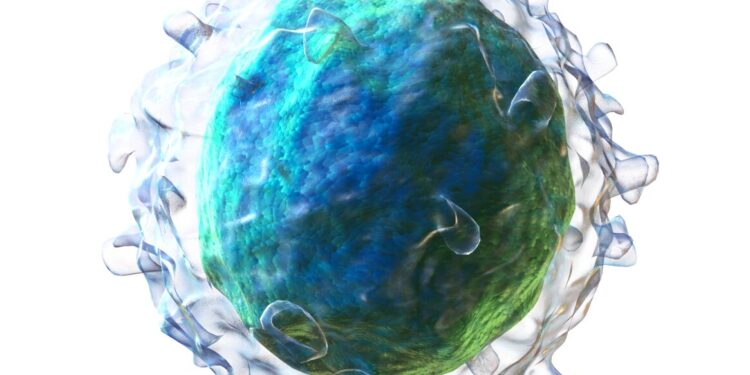3D rendering of a B cell. Credit: Blausen.com staff (2014). “Blausen Medical Gallery 2014”. WikiJournal of Medicine 1 (2). DOI: 10.15347/wjm/2014.010. ISSN2002-4436. CC BY-SA 4.0
B cell deficiency is a common condition that can result either from immunosuppressive medications used to treat autoimmune diseases or certain cancers, such as rituximab (RTX), or from a natural immune deficiency. These patients suffer from a weakened immune system, which is less effective in fighting viral and bacterial diseases. As B cells are a key type of immune cell that produces antibodies, a deficiency results in a significant decrease in the number of antibodies which can lead to severe illness or death if infected with SARS-CoV-2.
Researchers from the Ragon Institute of Mass General, MIT and Harvard; the Massachusetts Institute of Technology; the Koch Institute for Integrative Cancer Research; Monash University; Brigham and Women’s Hospital (BWH) and Massachusetts General Hospital (MGH) have discovered that vaccination against or infection with SARS-CoV-2 produces a robust T-cell response in B-cell-deficient patients , providing reassuring evidence in favor of immunocompromised individuals.
The results, recently published in Scientific translational medicineprovide key information on SARS-CoV-2 vaccination for patients with B cell deficiency as well as new understanding of immunodeficiency on a large scale.
“We found that patients who are deficient in B cells, either by treatment or naturally, have T cell responses to SARS-CoV-2 infection or vaccination that were significantly elevated compared to individuals healthy,” says Gaurav Gaiha, MD, DPhil, faculty. member of the Ragon Institute, assistant professor of medicine at Harvard Medical School, gastroenterologist at Massachusetts General Hospital and lead author of the study. “And in vaccinated individuals, they had significantly better clinical outcomes, even though they lacked anti-spike antibodies.”
Existing studies have already explored the impact of COVID-19 vaccination in people with autoimmune diseases who are undergoing treatment with specific B-cell-destroying antibodies. However, this study was the first to evaluate the impact of B cell deficiency following SARS-CoV-2 infection and to also evaluate the effect of vaccination on clinical outcomes in this immunocompromised population.
The results indicated that people with B cell deficiencies, even without detectable anti-spike antibodies, have increased CD8 T cell responses to SARS-CoV-2 after prior infection or vaccination. Significantly, these individuals experience significantly reduced hospitalization rates and moderate and severe COVID-19 cases after vaccination, despite having no detectable antibodies against the anti-spike protein.
“The question we asked ourselves when we started the study was about these people who don’t have B cells and who essentially won’t produce antibodies against SARS-CoV-2 infection or vaccination: what is the immunological result and is there a clinical benefit? for these B cell deficient patients to get vaccinated if they do not produce antibodies? » said Gaiha.
“And so I think the key result of our paper is that the answer is yes. Essentially, they should get vaccinated because they have much better clinical outcomes, probably because of these strong T cell responses. I think that this study provides important clinical guidance to this particular population of immunocompromised patients on this key question.
In summary, this research highlights the robust immune responses in B cell-deficient individuals following COVID-19 infection or vaccination. These responses, particularly CD8 T cell reactions, help reduce the risk of severe disease after vaccination, even in the absence of detectable antibodies.
More information:
Reza Zonozi et al., T cell responses to SARS-CoV-2 infection and vaccination are elevated in B cell deficiency and reduce the risk of severe COVID-19, Scientific translational medicine (2023). DOI: 10.1126/scitranslmed.adh4529
Provided by the Ragon Institute of MGH, MIT and Harvard
Quote: B-cell-deficient patients acquire protective immunity against T-cells after vaccination and infection with SARS-CoV-2, study finds (December 18, 2023) retrieved December 19, 2023 from
This document is subject to copyright. Apart from fair use for private study or research purposes, no part may be reproduced without written permission. The content is provided for information only.



